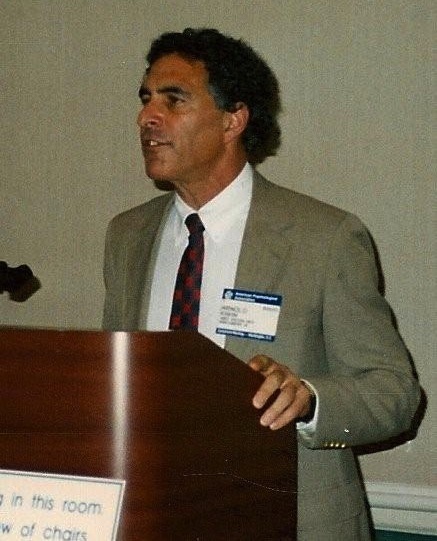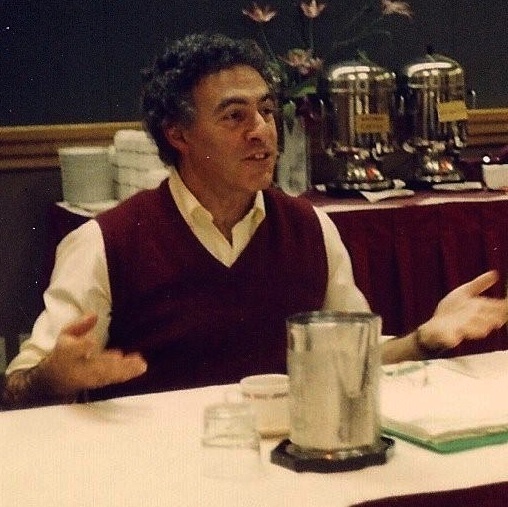Profile

Arnold Kahn
Birth:
1942
Training Location(s):
PhD, Southern Illinois University (1969)
MA, Southern Illinois University (1967)
BA, University of Missouri at Kansas City (1964)
Primary Affiliation(s):
James Madison University (1986 - Present)
Iowa State University (1968-1984)
Psychology’s Feminist Voices Oral History Interview:
Career Focus:
Social psychology of gender; sexual assault; violence against women; rape scripts and rape acknowledgment.
Biography
Arnie Kahn grew up in a family that promoted equality. More specifically, he lived in a household that was anti-racist, which paved the way for his involvement in the African American civil rights movement. Kahn's knowledge of the women's movement, however, remained limited until he was teaching an Introduction to Psychology class where he included "funny wrong answers to some of the questions on the exams, that often made fun of women". It wasn't until one of his female students informed him about his unwittingly offensive remarks that he suddenly realized what he was doing. As he noted years later, this incident was pivotal in his realization that he wanted to become part of the solution, rather than remain "part of the problem".
Kahn was inspired initially by his wife, Ronni, an activist writer and scholar, to join the local National Organization for Women (NOW) in the early 1970s. He also became involved in other local organizations, including The Iowa Women's Studies Association, for which he was program co-chair in 1980-81.
Both of Kahn's post-graduate degrees, his Masters and PhD, were completed at Southern Illinois University. His specialization was experimental social psychology. Kahn mentions that Sheldon Alexander, a social psychologist who studies justice, equity, and fairness, was an important mentor who helped him during his first two years of graduate school. While Kahn was in the process of completing his post-graduate education, both the women's movement and the civil rights movement were in full swing, thus providing the contexts that contributed to his research interests and career focus.
Once he began his research, his interest in gender issues and "straight social psychology" remained two distinct lines of research. Eventually, he began teaching Psychology of Women and Gender as well as Introduction to Women's Studies, where his mostly female students were surprised to see a man teaching these classes. Kahn notes that his early experiences with the Association for Women in Psychology and Division 35 (now the Society for the Psychology of Women) of the American Psychological Association (APA) made his gender very apparent; although there were "other men at least attending conferences in the early days," few were active on executive committees. In 1976, he became secretary-treasurer of Division 35, and has served on the Division's executive committee in a number of roles since then.
Kahn worked for the APA for about 5 ½ years on their Board of Social and Ethical Responsibility for Psychology (BSERP). Kahn credits this job as changing his career because it allowed him to work with the top psychologists in the country who were interested in social responsibility. Here, he learned about public policy issues, how to run meetings, and how to keep a group on track - skills that he has been able to make use of throughout his academic career at James Madison University in Virginia. One of Kahn's most exciting memories during his tenure at the APA was working with the Committee on Gay Concerns, which later became the Committee on Lesbian and Gay Concerns. His favourite part of participating in this organization was helping them learn how to work within rather than against the APA to achieve their goals.
After he left APA, Kahn decided to run for the Society for the Psychological Study of Social Issues (SPSSI) council, and won a seat. While on the council, he ran for the position of secretary-treasurer and was elected. Despite these political successes, Kahn describes that he never wanted to be the president of any division because of his love of working behind the scenes.
One of Kahn's major areas of research has been rape and sexual violence. This interest began while he was a Master's student and he began questioning why some women choose not to label their experiences as rape even though their experience matched the legal description of rape. Kahn designed research to explore the characteristics of varying scenarios that determined whether or not respondents labelled the scenario as rape.
In terms of how successful feminist theory, feminist approaches, and feminist therapy have been in influencing psychology, Kahn feels that, in many ways, they have been successful. He describes how feminist therapy is now included in counselling courses, and how issues relevant to women, such as abortion, violence against women, and equal wages have entered into the mainstream of the field. As Kahn explains, "Violence against women is something that is in every social psych textbook, but it wasn't when I started out." Kahn explains psychology's relationship with feminism by comparing academic psychology to a big foam rubber pillow; "as long as you're there pushing, you have an impact. The minute you turn your back, it goes away. It'll revert back to the way it was."
Kahn is a firm believer in the use of the word "feminist", and wants to see Division 35 re-named to include the phrase "feminist psychology". He believes that the term needs to be reclaimed by feminists, because opponents of feminism have defined it in their own way, with negative connotations. Kahn also claims that "one of the real differences between psychology and other fields, in terms of feminism, is psychology is slow to embrace post-modern thinking, qualitative methods, any other kind of methods other than empirical, counting and comparing." He believes that greater methodological pluralism in psychology could dramatically change the field and allow for the greater inclusion of feminist approaches and ideas.
When asked about what he would like to see in the future for Division 35, Kahn noted that he hopes that the Division's journal and newsletter continue to be inclusive and interesting, in addition to maintaining high standards. He adds that there will be an inevitable conflict between science and practice that "the division has been very fortunate in having, for the most part, avoided." However, avoiding conflict, Kahn philosophically adds, is "always a dangerous thing".
Ultimately, as one of few men willing to challenge boundaries with his feminist identification and orientation, Arnie Kahn has proven that he is not one to avoid conflict. His career is an inspirational example to both men and women of what can be achieved by challenging norms and stereotypes.
by Lori Caplan (2010)
To cite this article, see Credits
Selected Works
Kahn, A. S. (2004). What college women do and do not experience as rape. Psychology of Women Quarterly, 28, 9-15.
Kahn, A. S., & Andreoli Mathie, V. A. (2000). Understanding the unacknowledged rape victim. In C. B. Travis & J. W. White (Eds.), Sexuality, society, and feminism: Psychological perspectives on women. Washington, DC: American Psychological Association.
Unger, R. K., & Kahn, A. S. (1998). Bias in psychology: A reappraisal. Feminism & Psychology, 8, 51-57.
Gibson, P. R., Kahn, A. S., & Andreoli Mathie, V. (1996). Undergraduate research groups: Two models. Teaching of Psychology, 23, 36-38.
Powell, A. D., & Kahn, A. S. (1995). Racial differences in women's desires to be thin. The International Journal of Eating Disorders, 17, 191-195.
Kahn, A. S., Mathie, V. A., & Torgler, C. (1994). Rape scripts and rape acknowledgment. Psychology of Women Quarterly, 18, 53-66.
Kahn, A. (1984). (with the assistance of E. Donnerstein & M. Donnerstein). Social Psychology. Dubuque, Iowa: Wm. C. Brown Co.
Photo Gallery



Arnold Kahn
Birth:
1942
Training Location(s):
PhD, Southern Illinois University (1969)
MA, Southern Illinois University (1967)
BA, University of Missouri at Kansas City (1964)
Primary Affiliation(s):
James Madison University (1986 - Present)
Iowa State University (1968-1984)
Psychology’s Feminist Voices Oral History Interview:
Career Focus:
Social psychology of gender; sexual assault; violence against women; rape scripts and rape acknowledgment.
Biography
Arnie Kahn grew up in a family that promoted equality. More specifically, he lived in a household that was anti-racist, which paved the way for his involvement in the African American civil rights movement. Kahn's knowledge of the women's movement, however, remained limited until he was teaching an Introduction to Psychology class where he included "funny wrong answers to some of the questions on the exams, that often made fun of women". It wasn't until one of his female students informed him about his unwittingly offensive remarks that he suddenly realized what he was doing. As he noted years later, this incident was pivotal in his realization that he wanted to become part of the solution, rather than remain "part of the problem".
Kahn was inspired initially by his wife, Ronni, an activist writer and scholar, to join the local National Organization for Women (NOW) in the early 1970s. He also became involved in other local organizations, including The Iowa Women's Studies Association, for which he was program co-chair in 1980-81.
Both of Kahn's post-graduate degrees, his Masters and PhD, were completed at Southern Illinois University. His specialization was experimental social psychology. Kahn mentions that Sheldon Alexander, a social psychologist who studies justice, equity, and fairness, was an important mentor who helped him during his first two years of graduate school. While Kahn was in the process of completing his post-graduate education, both the women's movement and the civil rights movement were in full swing, thus providing the contexts that contributed to his research interests and career focus.
Once he began his research, his interest in gender issues and "straight social psychology" remained two distinct lines of research. Eventually, he began teaching Psychology of Women and Gender as well as Introduction to Women's Studies, where his mostly female students were surprised to see a man teaching these classes. Kahn notes that his early experiences with the Association for Women in Psychology and Division 35 (now the Society for the Psychology of Women) of the American Psychological Association (APA) made his gender very apparent; although there were "other men at least attending conferences in the early days," few were active on executive committees. In 1976, he became secretary-treasurer of Division 35, and has served on the Division's executive committee in a number of roles since then.
Kahn worked for the APA for about 5 ½ years on their Board of Social and Ethical Responsibility for Psychology (BSERP). Kahn credits this job as changing his career because it allowed him to work with the top psychologists in the country who were interested in social responsibility. Here, he learned about public policy issues, how to run meetings, and how to keep a group on track - skills that he has been able to make use of throughout his academic career at James Madison University in Virginia. One of Kahn's most exciting memories during his tenure at the APA was working with the Committee on Gay Concerns, which later became the Committee on Lesbian and Gay Concerns. His favourite part of participating in this organization was helping them learn how to work within rather than against the APA to achieve their goals.
After he left APA, Kahn decided to run for the Society for the Psychological Study of Social Issues (SPSSI) council, and won a seat. While on the council, he ran for the position of secretary-treasurer and was elected. Despite these political successes, Kahn describes that he never wanted to be the president of any division because of his love of working behind the scenes.
One of Kahn's major areas of research has been rape and sexual violence. This interest began while he was a Master's student and he began questioning why some women choose not to label their experiences as rape even though their experience matched the legal description of rape. Kahn designed research to explore the characteristics of varying scenarios that determined whether or not respondents labelled the scenario as rape.
In terms of how successful feminist theory, feminist approaches, and feminist therapy have been in influencing psychology, Kahn feels that, in many ways, they have been successful. He describes how feminist therapy is now included in counselling courses, and how issues relevant to women, such as abortion, violence against women, and equal wages have entered into the mainstream of the field. As Kahn explains, "Violence against women is something that is in every social psych textbook, but it wasn't when I started out." Kahn explains psychology's relationship with feminism by comparing academic psychology to a big foam rubber pillow; "as long as you're there pushing, you have an impact. The minute you turn your back, it goes away. It'll revert back to the way it was."
Kahn is a firm believer in the use of the word "feminist", and wants to see Division 35 re-named to include the phrase "feminist psychology". He believes that the term needs to be reclaimed by feminists, because opponents of feminism have defined it in their own way, with negative connotations. Kahn also claims that "one of the real differences between psychology and other fields, in terms of feminism, is psychology is slow to embrace post-modern thinking, qualitative methods, any other kind of methods other than empirical, counting and comparing." He believes that greater methodological pluralism in psychology could dramatically change the field and allow for the greater inclusion of feminist approaches and ideas.
When asked about what he would like to see in the future for Division 35, Kahn noted that he hopes that the Division's journal and newsletter continue to be inclusive and interesting, in addition to maintaining high standards. He adds that there will be an inevitable conflict between science and practice that "the division has been very fortunate in having, for the most part, avoided." However, avoiding conflict, Kahn philosophically adds, is "always a dangerous thing".
Ultimately, as one of few men willing to challenge boundaries with his feminist identification and orientation, Arnie Kahn has proven that he is not one to avoid conflict. His career is an inspirational example to both men and women of what can be achieved by challenging norms and stereotypes.
by Lori Caplan (2010)
To cite this article, see Credits
Selected Works
Kahn, A. S. (2004). What college women do and do not experience as rape. Psychology of Women Quarterly, 28, 9-15.
Kahn, A. S., & Andreoli Mathie, V. A. (2000). Understanding the unacknowledged rape victim. In C. B. Travis & J. W. White (Eds.), Sexuality, society, and feminism: Psychological perspectives on women. Washington, DC: American Psychological Association.
Unger, R. K., & Kahn, A. S. (1998). Bias in psychology: A reappraisal. Feminism & Psychology, 8, 51-57.
Gibson, P. R., Kahn, A. S., & Andreoli Mathie, V. (1996). Undergraduate research groups: Two models. Teaching of Psychology, 23, 36-38.
Powell, A. D., & Kahn, A. S. (1995). Racial differences in women's desires to be thin. The International Journal of Eating Disorders, 17, 191-195.
Kahn, A. S., Mathie, V. A., & Torgler, C. (1994). Rape scripts and rape acknowledgment. Psychology of Women Quarterly, 18, 53-66.
Kahn, A. (1984). (with the assistance of E. Donnerstein & M. Donnerstein). Social Psychology. Dubuque, Iowa: Wm. C. Brown Co.


